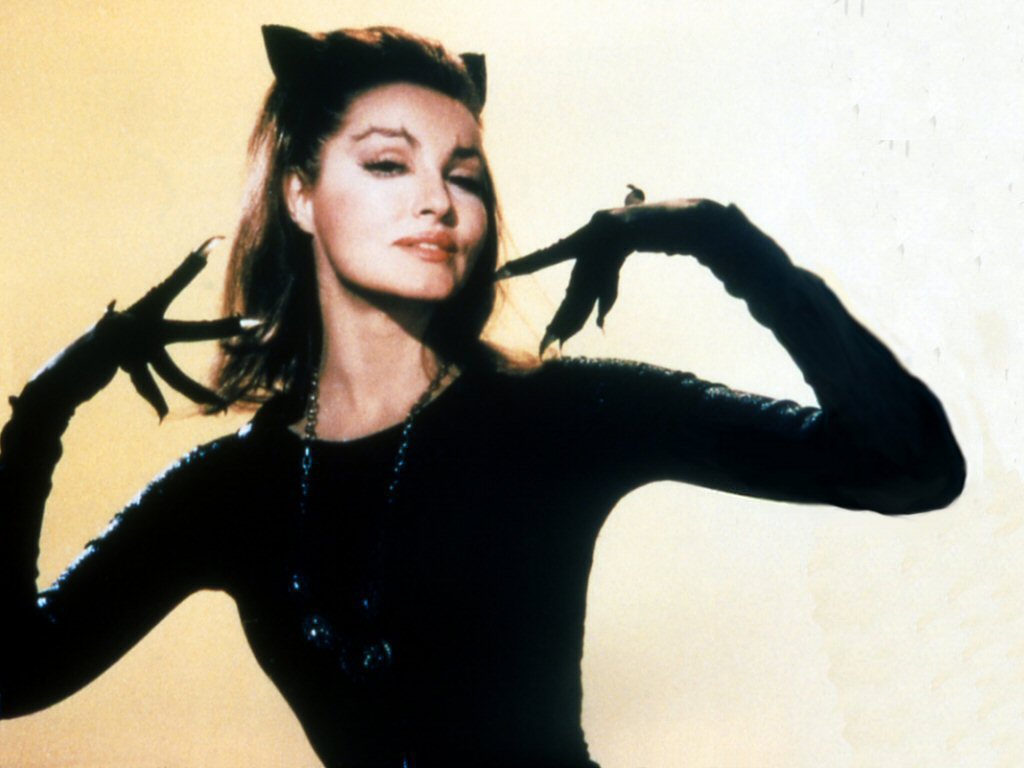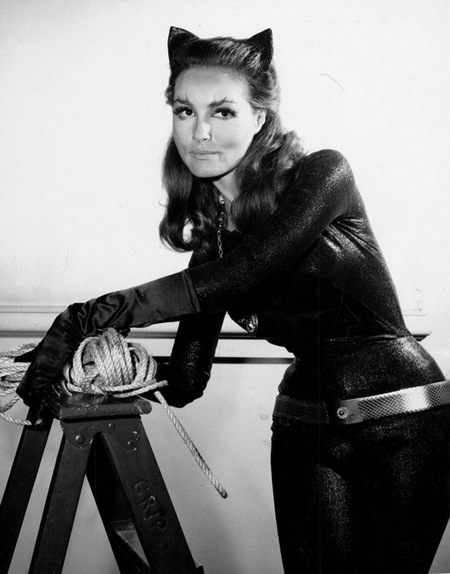
This is one in a series of weekly profiles leading up to the 2012 California Women’s Conference, which will be held at the Long Beach Convention Center September 23-24.
Julie Newmar’s voice is captivatingly eloquent—dare I say sexy—to the point of almost being a caricature. It has that hint of an accent which one can’t quite pin (studied in England? Speaks many languages? Raised on the elite end of the East Coast? Who cares?) and a softness that will calm even the most rattled of nerves.
“You’re down by the beach, are you not? Long Beach?” she asked after discussing her pleasure with the overcast weather she was experiencing. “Mmmhmm!” she noted at the end, as if hinting at some slight form of jealousy within her that sand was nearby.
This “mmmhmm” would be reverberated throughout our conversation—an idiosyncrasy of her speech that one easily becomes enamored with. It is a sound that can easily be compared with the calming purr of a feline, which may explain why her portrayal of Catwoman in the 1960s Batman television show has set the standard for the role.
Newmar is the quintessential Catwoman (something she loves since it gave her an audience—”is there anything more beautiful than that?”), but doesn’t like the concept that a woman can be owned by a man in Hollywood.
“I prefer that word you used—’muse.’ Isn’t that a sweeter way of exhibiting yourself? Of being present? To be any man’s muse is a pretty desirable spot,” she says. “I like that—a muse. But owning? Not in any century I’ve ever lived in.”
Newmar continues to be an empowering figure for women. “I’m so proud of what women have accomplished as I’ve seen it in my life. I saw right outside my house here a woman… She was walking at quite a fast pace, dictating her finances to someone. She was feeding someone her credit report while exercising! You would have never seen that a generation or two ago.” However, she isn’t militant about gender issues but, in her own terms, “would rather just focus on love. Love, yes.”
In fact, of all the women I’ve had the privilege of speaking to in the months leading up to the California Women’s Conference, Newmar was the one—with her bent angle on love—who turned the conversation towards my own personal life. She was discussing the teachers who molded her—”women, you see, not men, mmmhmm” —when I informed her of the influence of women on my own life: the Maya Angelous, the Sylvia Plaths, the Virginia Woolfs, and, of course, my grandmother.
“The experience within your family and the gift in your life,” she said, “is precisely what you just said. You’re really bringing out those qualities of others—the love—and telling the world about it, you could be more sanguine, more available, you can find an ease within life, mmmhmm.” Her words were drawn out and lengthened, almost like a hypnotist.

“This all causes you to reeeallly look within yourself. Not to heal because there’s nothing to heal there for you really, but to progress further in life with that great rawness of love your grandmother and those women had.”
And for Newmar, it is this thing—picking up the traits of others and exemplifying them—that make the world a more sapid place and, unlike most who think we should all have traits that make our environment more palatable, she feels this is not the way it functions. She spoke of partnerships and how, contrary to common thinking that partnerships are reciprocal, requiring this even exchange of give-and-take, they are uneven.
“We must pick up the slack of others. Your partner may be good at numbers and you may decorate the inside of the house impeccably. It is up to you to tell your partner, ‘Go do that,’ while it is up to your partner to tell you, ‘Go do that.’ We have to love the vacuum as well as the presence of something.”
Her philosophy is not catchphrase drivel. She is, when you hear her speak, fully consumed by it with a conviction that is rare amongst the all-too-common postmodern adage that everything is on an even playing field. She holds beliefs and rarely does she reference these beliefs through concrete concepts but rather, reaches for the abstract, bringing our conversation of relationships into the fear that many people have with the concept of nothingness.
“Do you know this is why people do drugs?” she says. “To dive into the unknown because the unknown is the most knowing place, Brian. I mean, it knows itself, doesn’t it? Just because you don’t know your neighbor across the street doesn’t mean he isn’t known.”
This is why performance is so important to her. It permits a sense of freedom via this unknown she speaks, freedom particularly from the confines of one’s self. Acting—be it on a stage in dance or in front of a camera on film—is a form of escapism that grounds a sense of limitlessness. “There are all those parts of consciousness that hadn’t been readily explored until you are asked to play the role. Acting is a marvelous endeavor. We all grow up on so many dos and don’ts and acting eradicates that. Children do it all the time and it’s called play—we just have to re-learn it when we become adults.”
And she is trying to teach this—among many other things—to everyone she meets, including through her book The Conscious Catwoman Explains Life on Earth. Even with the success she has achieved through television and film, she doesn’t dismiss the idea that we must all exude our strengths—and the one universal strength we hold is love.
“Life is really the expansion of itself,” she says. “All of us learning how to love, how to love more, forgive and love, have a little nervous breakdown, and then love some more.”

